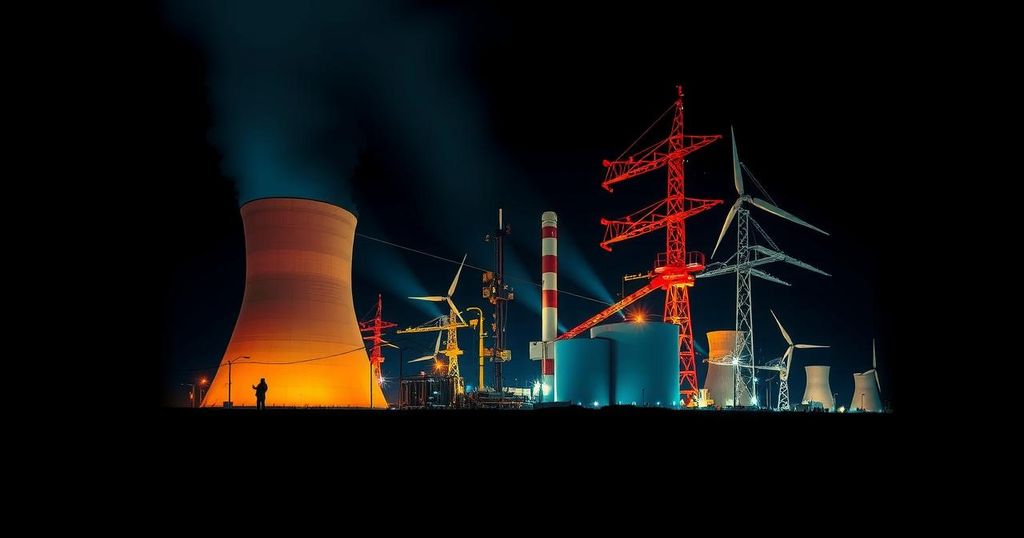The nuclear industry grapples with two major barriers: economic viability and public acceptance. While financial stability is seen by some as the key to revitalizing nuclear power, others emphasize the importance of addressing emotional and safety concerns influencing public perception. This dual conflict complicates progress, particularly in the face of strong anti-nuclear opposition. Meanwhile, developing countries face unique challenges concerning governance and global partnerships. Ultimately, both factors must be addressed for the nuclear industry to flourish in a zero-carbon future.
Across the landscape of energy production, nuclear power stands at the precipice of opportunity and challenge. Despite decades of technological advancements and a pressing climate crisis that underscores the need for clean energy, the sector’s share of the global electricity mix continues to decline. As governments begin re-evaluating their energy portfolios to align with zero-carbon futures, the nuclear industry finds itself grappling with persistent barriers: the dual specters of economic viability and public acceptance. Each issue looms large, often dividing perspectives within the industry itself.
For proponents arguing from an economic standpoint, the key to reviving nuclear’s fortunes lies in proving that projects can be completed on time and within budget. They argue that when financial hurdles are overcome, public fears will diminish, making way for a surge in nuclear investment. However, history shows that high capital costs and controversial project delays have given rise to skepticism. To many, the nuclear industry’s struggles are self-inflicted, a result of management missteps rather than public opposition. In this view, it’s clear: a stable financial foundation could transform nuclear energy from a contentious subject into a flourishing enterprise.
On the flip side of the debate, industry insiders with roles in communication might contend that while economic considerations are pertinent, they represent a fraction of what influences public perception. Elements like safety concerns and the emotional weight tied to nuclear accidents play a significant role in shaping societal attitudes towards nuclear power. Despite the emphasis on rational discourse, the emotional resonance of fear often trumps logic, creating a chasm between industry aspirations and public sentiment. In the eyes of this group, addressing the fears associated with nuclear energy, particularly around safety and waste, is not merely preferable; it is essential.
As these two factions duel for precedence, the discourse morphs into a fiery debate rather than a rational analysis, complicating any potential consensus on the future of nuclear energy. The presence of well-funded anti-nuclear organizations only exacerbates the situation, actively undermining political support and curtailing meaningful policy reforms that could facilitate nuclear development. This ongoing struggle hints at a deeper complexity—one where overlapping concerns about finance and perception must coexist in harmony for the industry to succeed.
Yet, beyond Western shores, another narrative unfolds. In developing nations, the barriers to nuclear growth are less about public acceptance or economics and more about issues of governance, capability, and international collaboration. These countries often look to established nuclear powers for support as they navigate the uncharted waters of reactor development.
Ultimately, the competition between economic viability and public acceptance reveals a more intricate mosaic of factors influencing nuclear energy. While there is no straightforward answer to which challenge holds more weight, it is evident that addressing both aspects is critical for ushering a new era of nuclear progress. As the world transitions towards a cleaner energy future, the nuclear industry must not only enhance its economic arguments but also engage in candid conversations addressing public concerns. Only then can it truly begin to turn the tide in its favor.
The nuclear industry is currently facing significant challenges despite its potential role in combatting the climate crisis. Countries are increasingly looking to reevaluate their energy mix to achieve carbon neutrality. However, the industry struggles to gain momentum, largely due to two primary factors: economic concerns and public acceptance of nuclear energy. These barriers not only impact project development but also create a divide among industry stakeholders regarding the best approach to rejuvenate nuclear power’s prospects.
In conclusion, the enduring debate between economics and public acceptance reveals fundamental issues faced by the nuclear sector. Acknowledging both aspects is crucial for redefining nuclear energy’s place in a sustainable future. As global energy demands grow, engaging with public sentiment while reinforcing economic arguments will be key in overcoming the challenges to nuclear advancement. Solutions must be multifaceted, addressing both concerns to facilitate a harmonious and successful transition towards clean energy.
Original Source: www.neimagazine.com



